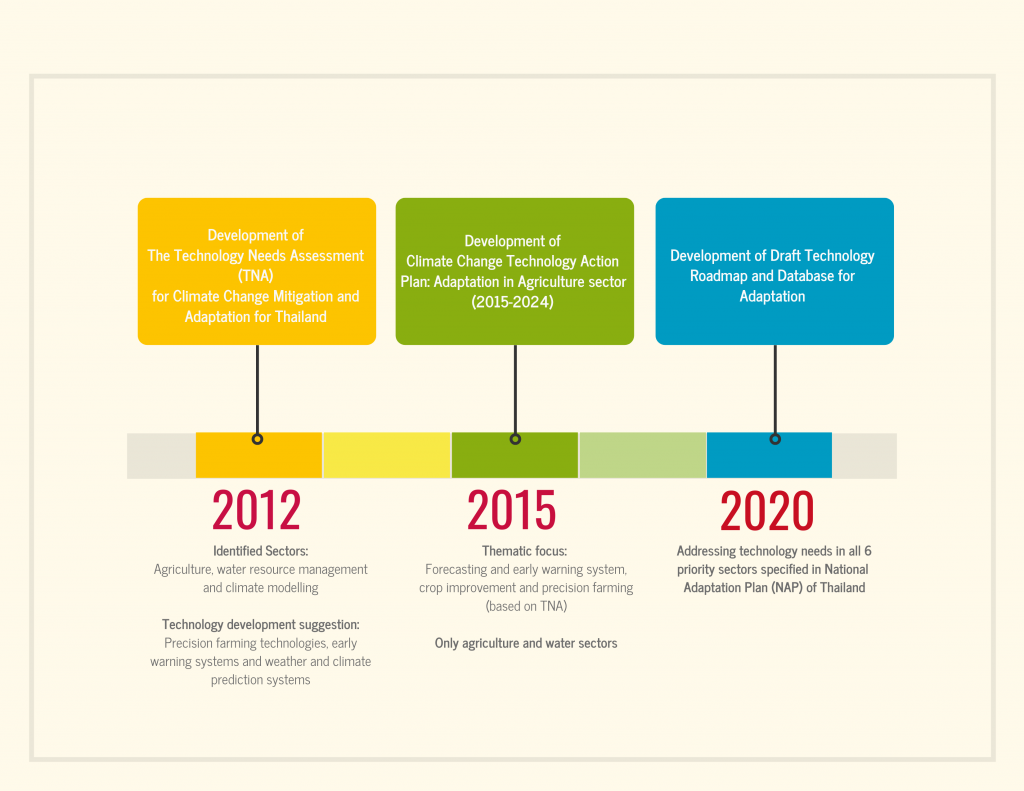The Office of Natural Resources and Environmental Policy and Planning (ONEP) and the Office of National Higher Education, Science, Research and Innovation Policy Council (NXPO) supported by Thai-German Climate Programme – Policy (TGCP – Policy) are working on identifying the technology needs for adapting to climate change in Thailand.
In recent decades, changes in temperatures and rainfall patterns have significantly affected food production and the livelihoods of people. Thailand’s climate-dependent agricultural system, long coastline, and its susceptibility to such climate-induced disasters as floods, drought and extreme weather events, make it vulnerable to the effects of climate change.
Adapting to a changing climate is a pressing need. Technology, one of the key cross-cutting tools amongst various adaptation measures, will help reduce vulnerability. It can help increase society’s coping capacities and resilience against changing climate conditions, improve productivity and promote more efficient use of threatened resources.
The Technology Needs Assessment (TNA) for addressing climate change was launched in Thailand in 2012.

Since the development of a “Climate Change Technology Action Plan: Adaptation in Agriculture sector”, the technology suggestions for adaptation have been mainly limited to the agriculture and water sectors. As such, further development and studies on the potential of technology development options are essential to enhance the adaptive capacity of the Thai people.
Launched in 2020, the Development of the Climate Technology Roadmap and Database: Adaptation Project is a partnership between the Office of Natural Resources and Environmental Policy and Planning (ONEP) and the Office of National Higher Education, Science, Research and Innovation Policy Council (NXPO), who are the mandated focal points for climate change and climate technology respectively. This partnership is facilitated by TGCP–Policy through research and technical expertise, and is aimed at addressing technology needs in all 6 priority sectors specified in National Adaptation Plan (NAP) of Thailand, comprising agriculture and food security, water management, natural resources management, human settlement and security, tourism and public health. After prioritising technology options, technology roadmap and database will accordingly be developed.
These technologies will include “hard” technologies such as equipment and infrastructure as well as “soft” technologies, including decision-making processes, management practices and institutional arrangements. They will also consider local practices and local wisdom, taking into account the local context of adaptation. The technologies will be identified, scrutinised and prioritised by experts and related government agencies through a participatory process. Advantages, barriers and solutions to the application of the technology will be identified. The roadmap will be formulated through stakeholder consultation.
Concept notes on the potential technology for 6 priority sectors will also be developed. “NXPO could make use of these concept notes and roadmap for revising the Higher Education, Science, Research and Innovation Policy and Strategy,” said Dr. Surachai Sathitkunarat, Assistant to the President, NXPO.
For recommended technologies to be implemented, at least two policy sandbox proposals will be developed and feasibility analysis will be conducted to assess gaps and barriers, including regulatory barriers, and to recommend incentives to create enabling conditions for future implementation.
“Taking the development of basic technologies based on country’s capacity as well as our local content into consideration would be good for Thailand in sustaining technologies.” Dr. Natthanich Asvapoositkul, Director of Climate Change Management and Coordination Division, said.